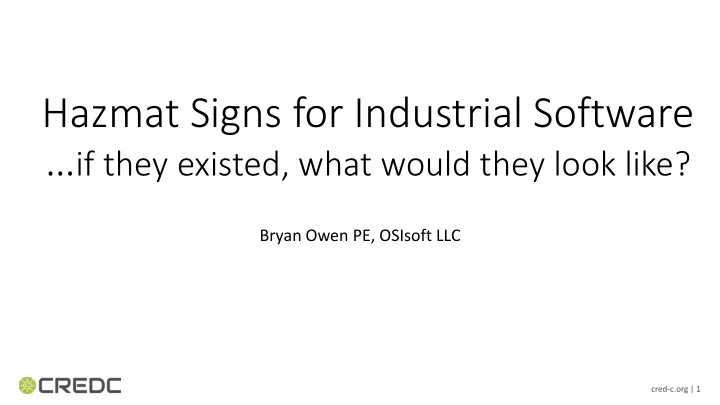

Hazmat Signs for Industrial Software … if they existed, what would they look like? Bryan Owen PE, OSIsoft LLC cred-c.org | 1
Most Industrial Software is ‘Toxic’ cred-c.org | 2
Toxicity The degree to which a chemical substance can damage an organism • Whole organism • Organs, • Tissue, • Or even cellular damage. cred-c.org | 3
Toxin Categories Biological Corrosive Physical Non-Ionizing Hazard Hazard Hazard Radiation Hazard cred-c.org | 4
“Cyber” – Bio Hazard Abuse of legitimate ICS functionality • Stuxnet • Crashoverride / Industroyer • Eg Protocols: IEC101, IEC104, and Biological IEC61850 Hazard cred-c.org | 5
“Cyber” – Corrosive Hazard Non-ICS specific Ransomware & Wipers • Brickerbot • Not Petya / WannaCry • Shamoon Corrosive • Eg Protocols: SMB, Telnet Hazard cred-c.org | 6
“Cyber” – Physical Hazard Enlistment in bots • Carna • Mirai • Reaper • And many other similar threats Physical Hazard cred-c.org | 7
“Cyber” – Radio Hazards Recent malware targeting radios • BadBIOS • BlueBorne • WPA2 Krack Non-Ionizing Radiation Hazard cred-c.org | 8
Chemical Hazard Labels – NFPA Diamond 0 4 FLAMABILITY Least Most Serious Serious HEALTH REACTIVITY 0 Will Not Burn SPECIAL HAZARDS Shock and Heat 3 May Detonate cred-c.org | 9
Cyber Hazard Labels: “C-I-A Triad Model” Remote, Anonymous, Default 4 Configuration, Root Access INTEGRITY Remote, Anonymous, Default 3 Configuration, User Access Remote, Authenticated, Default 2 CONFIDENTIALITY AVAILABILITY Configuration, Root Access Remote, Authenticated, Custom 1 Configuration, Write Access SPECIAL Remote, Authenticated, Read 0 HAZARDS Access cred-c.org | 10
Cyber Hazard Labels: “V-A-T Model (OSSTMM)” 1/2 VISIBILITY 4 ACCESS Remote management endpoints 3 Remote write access endpoints VISIBILITY TRUST 2 Remote read access endpoints 1 SPECIAL Device broadcasts HAZARDS 0 No targets visible remotely cred-c.org | 11
Cyber Hazard Labels: “V-A-T Model (OSSTMM)” 2/2 TRUST Unmanaged 3P components, 3P 4 ACCESS managed trust infrastructure 3 Unmanaged 3P components VISIBILITY TRUST 2 3P managed trust infrastructure Self-managed 3P components, 1 SPECIAL trust infrastructure HAZARDS Trusted foundry with 0 transparency cred-c.org | 12
Cyber Hazard Labels: Cornell “SoS” Blueprint Blueprint for a science of cybersecurity Safety The Next Wave Vol. 19 No. 2 | 2012 Fred B. Schneider • No ‘bad thing’ happens ISOLATION Liveness • Some ‘good thing’ happens OBFUSCATION MONITORING SPECIAL HAZARDS cred-c.org | 13
Special Cyber Hazards: “Observables” • Digital signature or unique hash • Documentation of third party components • Important dates (creation, last modified) • Memory safe frameworks and languages • User mode vs kernel or root A badness-omemter can’t tell you that you’re secure. • Execution flags (ASLR, CFG, DEP, NX, etc…) It can only tell you that • Network protocol safety you’re not. • Software update mechanism Badness-ometers are good. Do you own one? by Gary McGraw https://www.synopsys.com/blogs/software-security/badness-ometers-are-good-do-you-own-one cred-c.org | 14
Idea: Safety Data Sheets cred-c.org | 15
Cyber Security Data Sheets Cyber Security Technical Assessment Methodology: Vulnerability Identification and Mitigation 3002008023 Final Report, October 2016 Michael Thow – EPRI Steve Hagan – Fisher Valves Dan Griffin – JW Secure John Connelly – Exelon Inman – Lanier – Fisher Valves Justin Kosar – Assoc. Electric Cooperative Manu Sharma – Exelon Mike Hagen – Fisher Valves Andrew Dettmer – Assoc. Electric Cooperative Kenneth Levandoski – Exelon Andrew Clark – Sandia National Laboratory Steve Ricker – East Kentucky Power Cooperative Brad Yeates – Southern Company Matthew Coulter – Duke Energy Phillip Turner – Sandia National Laboratory Scott Junkin – Southern Company Susan Ritter – Duke Energy Tim Wheeler – Sandia National Laboratory Richard Atkinson – Arizona Public Service Mark Denton – Duke Energy Alice Muna – Sandia National Laboratory Sandra Bittner – Arizona Public Service Norman Geddes – Southern Eng. Services Christine Lai – Sandia National Laboratory cred-c.org | 16
EPRI TAM Overview cred-c.org | 17
EPRI TAM – Attack Surface Characterization cred-c.org | 18
Reference Cyber Security Data Sheets A key part of the Supply Chain • Step 1 & 2 by EPRI, Vendors, and Big Idea: other Stakeholders You can create a • Starting point for tailored CSDS CSDS too! Cyber Security Technical Assessment Methodology: Vulnerability Identification and Mitigation 3002008023 cred-c.org | 19
http://cred-c.org @credcresearch facebook.com/credcresearch/ Funded by the U.S. Department of Energy and the U.S. Department of Homeland Security
Recommend
More recommend